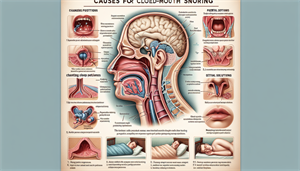
Understanding Closed-Mouth Snoring
Closed-mouth snoring is a phenomenon where individuals snore despite their mouth being closed, or in other words, having their “mouth closed.” It suggests that the root of the problem lies within the nasal or throat airway rather than the mouth. This form of snoring may occur due to obstructions in the airway, such as blocked nasal passages, enlarged tonsils, or weak palatal tissue.
One method of reducing snoring involves practices that target the mouth and throat. These exercises have been designed to strengthen and tone the muscles in the mouth, throat, and other parts of the upper airway, potentially reducing snoring and moderate obstructive sleep apnea. Throat based snoring can also be mitigated with myofunctional therapy that focuses on strengthening the muscles in the oral, facial, and throat regions.
Nasal Congestion
Nasal congestion plays a significant role in closed-mouth snoring. It obstructs the airway, leading to difficulty in nasal breathing and, consequently, snoring. Various factors can lead to nasal congestion, including: Minor illnesses like the cold, flu, and sinus infections, allergies and hay fever, nasal polyps, deviated septum, and enlarged adenoids or tonsils.
Identifying and addressing the underlying cause of nasal congestion can help reduce snoring and improve sleep quality. For individuals with sleep apnea, structural issues like a deviated septum, which can cause nasal congestion, are significant contributors to snoring. Moreover, allergies can induce nasal congestion, leading to closed-mouth snoring. Therefore, addressing nasal congestion is a crucial step in improving breathing and promoting a good night’s sleep.
Tongue Position
The position of the tongue while sleeping is another key element contributing to closed-mouth snoring. Incorrect positioning of the tongue can obstruct the airway, leading to snoring. Tongue-based snoring occurs when the tongue relaxes and obstructs airflow into the lungs, resulting in breathing difficulties.
Certain tongue positions, such as placing the tongue upwards against the roof of the mouth or moving it backward along the roof, can assist in strengthening tongue muscles, enhancing tongue position, and thereby decreasing closed-mouth snoring. Individuals who experience snoring caused by the position of the tongue may find benefit from mouth taping as it can help prevent the tongue from falling back into the throat.
Throat Muscle Relaxation
Relaxation of the throat muscles also plays a role in the occurrence of closed-mouth snoring. When the throat muscles relax excessively, they can constrict the airway and generate vibrations while breathing, resulting in snoring. During sleep, all muscles in the body, including those that assist in keeping the airway open, relax. However, in some individuals, the muscles relax too much, leading to snoring.
Non-invasive remedies for closed-mouth snoring include adjustments in sleep position, breathing exercises, and maintaining an ideal room humidity, alongside lifestyle changes like weight management and avoiding alcohol and sedatives. Anti-snoring devices such as nasal dilators, chin straps, and Mandibular Advancement Devices, alongside lifestyle adjustments, can provide individualized solutions to closed-mouth snoring; persistent cases may require medical consultation.

